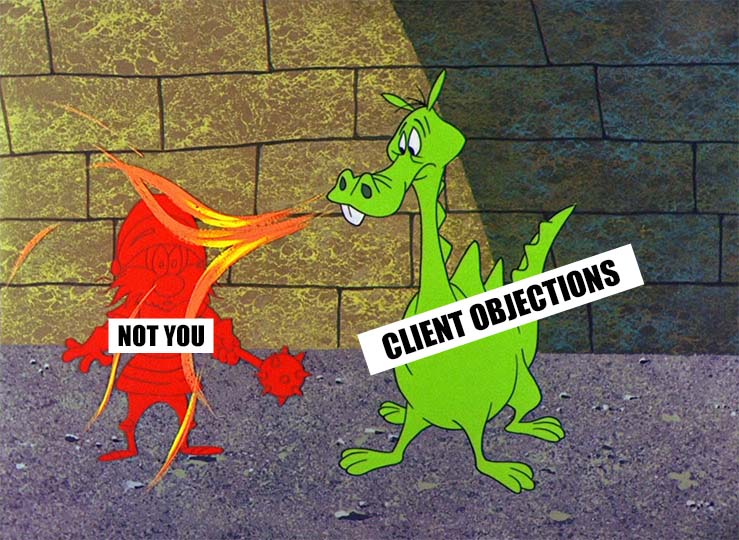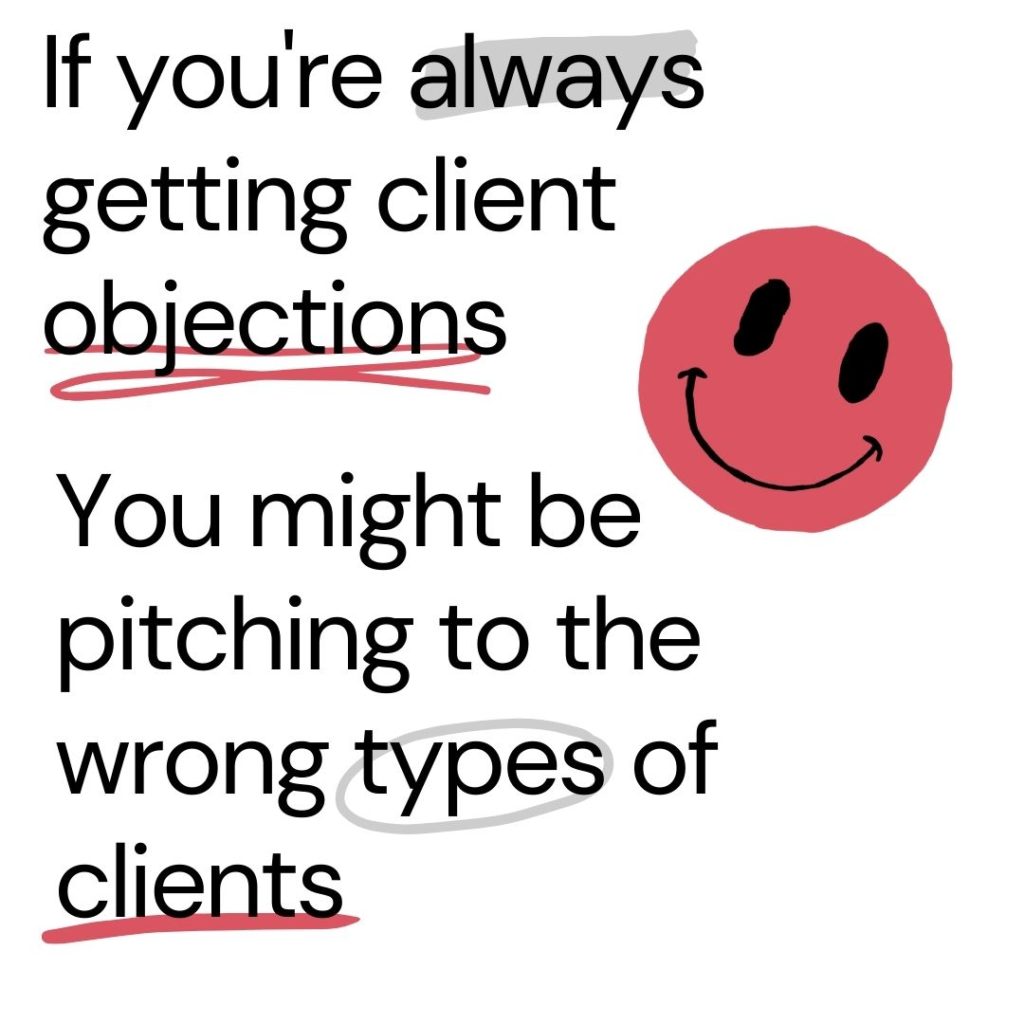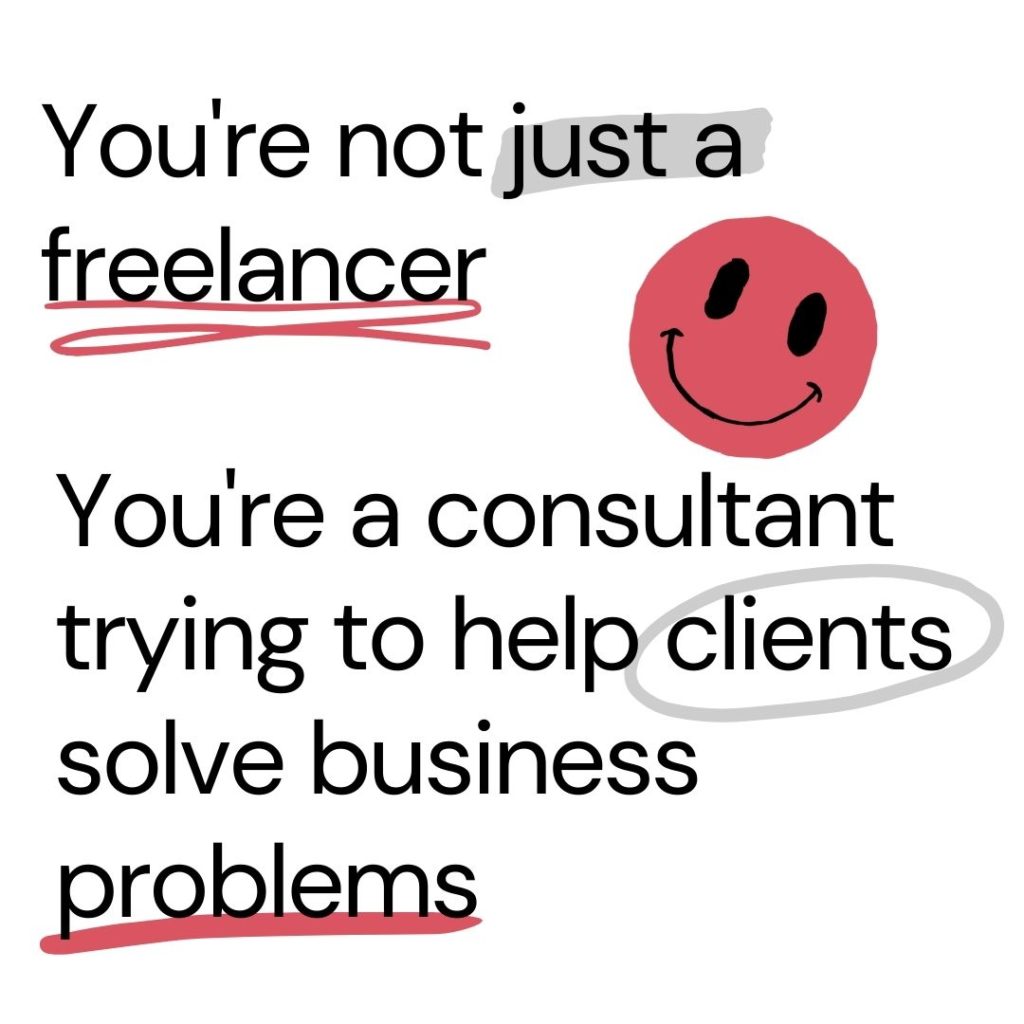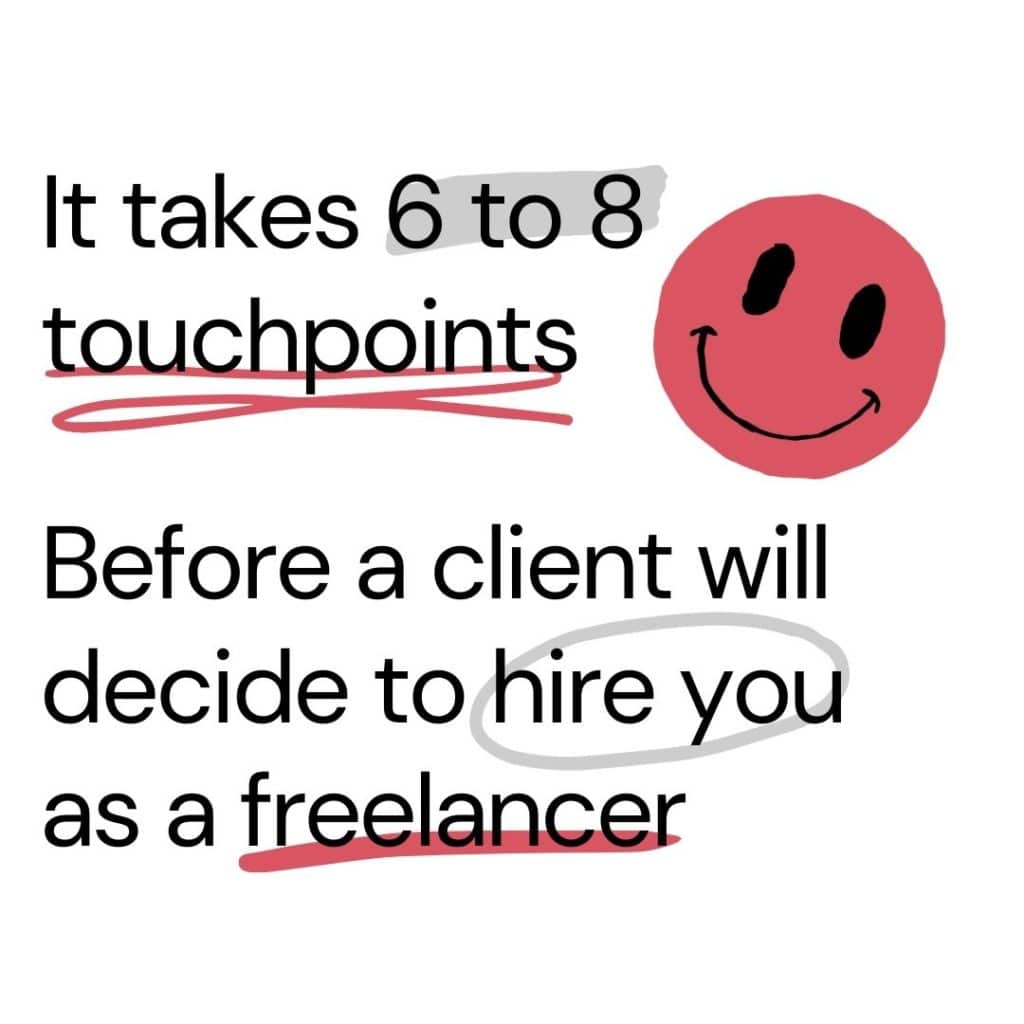It’s inevitable. You will one day be faced with a list of objections from a potential client as a freelancer.
And, the way I see it is you’ve got a few options when that happens:
- Act defensive and turn them off from working with you altogether
- Throw your hands ups and not even try
- Figure out a way to respond to the client’s objections that actually helps them see you’re the perfect freelancer for them
Obviously, that third one is the one we’re shooting for, BUT when you’re right in the middle of the moment it’s tough to come up with answers on the spot.
You get nervous. Your hands start sweating and you start questioning why you decided to be a freelancer at all.
Yet, all is not lost! You’ve got plenty of ways to slay the client objections dragon as a freelancer!

1. Prevent Freelance Client Objections from the Start

Let’s first start off with a bit of prevention. Because, after all, if you’re constantly getting tons of objections from every potential client you’re pitching to then you’re probably going after the wrong people.
A lot of freelancers pitch to absolutely every possible client out there. The problem is that strategy doesn’t work well at all. And, if it does, it’s more because of sheer luck.
You end up wasting your time talking to people that would NEVER ACTUALLY be interested in hiring you in the first place. And, you could end up pitching to 100’s of clients before you actually get someone to say, “yes.”
You want to consider yourself a freelance sniper rather than sending out proposals like shotgun spray.
To do that you have to know which clients you serve best in this season of your freelance career.
And, yes, that could mean a specific niche that you serve, BUT it could also mean where the client is at in the specific season of THEIR BUSINESS.
For instance, if you’re trying to go after higher paying clients, you might want to go after business that are a bit more established and have good profit margins.
Companies that are just starting and don’t have seed money from investors are going to be more budget focused than they are value focused. All they’re trying to do is get up and running as quickly and as cheaply as possible.
So, it’s going to be tough to convince them to pay you a premium price when they’re trying to pinch pennies. So, you’ll have to overcome a lot of objections to actually seal the deal.
More than likely, they weren’t the ideal client for you if you’re having to do a lot of convincing.
2. Be Able to Show Your Value
Okay, so you’ve found the right clients to get in front of BUT NOW they’re questioning why you’re priced so high. After all, they could easily find someone to do it for 1/3rd of the price your charging.
This is a pretty common client objection that freelancers get. And, most of the answers out there are pretty snobby honestly.
It’s almost trendy right now to respond by saying, “How dare you question my value as a freelancer!” or something similar.
There’s even a popular TikTok song that pretty explicitly complains about this client objection. I’ll leave it here but listen at your own risk. They aren’t nice about it.
Don’t be precious.
You can’t just tell clients they should pay you a ton of money because you “feel like you’re worth it.”
And, it shouldn’t upset you when a client asks, “Why are you worth that much.” Don’t look at it as an attack. Look at it as an opportunity to educate someone who has little to no experience doing what you do.
As a freelancer, it’s important that you have a way to verify what you’re worth. You can do that a few ways.
The first and best way is to do it with real verifiable data.
So, for instance, if you redesigned a website for a client and they were able to sell 3x the amount of products from their online store after you helped them THAT’S A GREAT WAY TO JUSTIFY WHAT YOU’RE WORTH.
You could easily say, “I’m going to charge you X but you’ll make XX more next year as a result of working with me.”
Of course, in order to do that you need to make sure you’re documenting those things. So, be sure you’ve got access to a client’s initial data and take note of the improvement after you’re finished.
You could also justify your price by talking about the quality of service or deliverables you’ll give to your clients versus other freelancers.
Most people intrinsically know that cheaper will almost always mean lesser quality.
We don’t expect the same quality of food or service from the McDonald’s dollar menu as we do a Ruth’s Chris Steak House.
So, you might need to ask your client if they are at a season where they have the time and patience to be able to deal with a lower-quality freelancer just because they’re cheaper.
In fact, at the end of the project they might actually find out they paid for something they can’t even use and they have to go back to square one. So, it ends up costing them more money in the long run.
The bottom line is pricing is a pretty common client objection. So, you’ve got to be prepared with some answers as to why you charge what you do.
3. Become a Problem Solver

A lot of client objections are really just problems that they aren’t able to solve themselves.
When those types of objections arise this is where you get a chance to be more than just a freelancer. You now get to put yourself in the spot of a business consultant.
In other words, take what you do as a freelancer and show them how you can build a solution for them that helps with their issue.
For instance, another common objection clients will say to freelancers is that they’re too busy in their business to work with you. This could be because they’re actively working in their business and don’t have time to do much else than just keep it running.
BUT, it could also be because they don’t have the systems in place to maintain the level of work they have and they don’t want to add more business. Doing that will make things even crazier and cause even bigger problems.
So, if you’re a web designer, show them how you can set up an automation system on their website whenever they get a lead that does 80% of the work for them. It will free them up from busy work and allow them to grow their business without working 100+ hours a week.
Bam! You’re not just a freelancer you’re a problem-solving, business consultant, expert who happens to do freelance work.
A friend of mine named Lee Blue says that in order to stand out you need to commit to being a consultant first. You’ve got to be someone who figures out how to solve real problems for a business with the expertise you have.
Think about their objection and try to come up with a solution that solves their problem.
4. Keep At It

You’ve got to keep connecting with clients even if they have objections and don’t hire you right away when everything is said and done.
I’ve heard it said that it takes 6 – 8 touchpoints before a client will decide to hire you. The problem is most freelancers give up after the first rejection.
You need to have a game plan to keep following up with clients even if they decide not to hire you on the first interaction.
The important thing here is that you need to make sure you aren’t pushy about it. The best approach is to really just try to build a relationship with someone without having the pressure of turning it into a sale.
It’s always good for business when you value the relationship over the sale or people over profit. You just have to be patient and keep at it.
I like to send emails or messages when I see their business hit a milestone. That way it’s not just another, “Hey I wanted to follow up with you” message. Those are never fun and always off-putting.
Freelance Client Objections Get Easier with Time
Freelance client objections will get easier to handle the more you go along. In fact, you’ll begin to see some patterns emerge.
When that happens you’ll begin to develop an arsenal of responses that you will have found worked on other clients that you can confidently use in the future.
It’s just a matter of sticking with it and figuring it out.
I was able to talk to a freelancer this last week and give him some advice on handling client objections. Here’s our conversation:
[00:00:00] Chris: Have you heard this freelancer song on Tik TOK “it cost that much because it takes me @#$%ing hours” It's a really popular song because to be honest, dealing with client objections can be tough, but not for you, my friend, because this week we're going to talk about how to easily overcome objections as a freelancer and win more product.
Are you ready? Let's go
What is up self maders. Welcome to another episode of the self-made web designer podcast, a listener named Josh reached out and wanted to chat. And obviously, I said, yes, Josh has been freelancing for about six months now and he's killing it. He's gotten about $2,000 worth of. Already, but he's been running into some roadblocks as he's tried to start charging higher rates.
The clients he's been talking to have been objecting to his higher prices, how could they, so I thought, Hey, Josh, let's get on a call and record our conversation because dealing with client objections is actually something that every freelancer is going to have to deal with. And the good news is. There are some things that you can do to actually turn those objections into an opportunity to show your client just how perfect you are for them.
But before we dive into my conversation with Josh, I got to ask, have you subscribed to the self-made? Designer podcast doing that. We'll give you weekly tips on how to level up as a freelancer, start charging higher rates, and ultimately crush it as a web designer. So do that now. Also, if you want to find the transcript for my conversation with Josh, there will be a link to do that in the episodes show notes.
All right. Are you ready to hear my conversation with Josh talking about how to easily overcome client objections as a freelancer? Win more projects. All right, let's do it. So, so your question is, you know, you've got some clients who are, um, her coming to you, you're having consultation calls with them.
They're kind of kicking back on your price and saying, um, you know, there are lower price options available. So how, how do I, how do I convince these folks of your value? Or how do you stand out from the folks who are kind of the lower price option? Am I hearing that right?
[00:02:24] Josh: Yeah. That's right. That's exactly what I've been dealing with.
[00:02:26] Chris: Yeah. Yeah. Yeah. Okay. It's, it's a real common thing for folks who are just getting started, but a couple of things I think you're doing right already, and I just kind of want to point it out is number one, you're getting in front of folks. Right? So you're having those calls. That's something that a lot of folks who are just getting started, you've only been doing this for six months.
And so like a lot of folks are just like, how do I get in front of people and have conversations. Um, them about, you know, selling them a website or rebuilding or whatever. So, so that, that is great. So, The other part to that is learning how to get in front of the right people. Right. So, um, rather than getting in front of folks who are looking for they're, they're this they're, what's called price-driven clients, right?
Like, um, that is their litmus test for whether or not this is worth it. Like how cheap can I get it for? And if, if you are always getting in front of price driven clients, this will always be a conversation. That you have. Um, so, you know, the first thing would be to try to figure out how to find clients who aren't price driven as much as they're value driven.
Right? So they're not just looking for the lowest cost alternative. They're looking for something that is really going to move the needle for their business, and they're willing to pay a little bit more for it, you know? So. Um, that that would be the first step in the strategy is where the leads coming from.
Are you getting the right ones to come to you? Who, you know, you obviously want to scale up in your prices, so you don't want to stay at where you're at right now. So, you know, look for those folks who they're at a place in their business where they're probably not just starting out, you know, because folks are just starting out.
They're more price-driven um, because they're just trying to get something out the door. They're trying to get it out the doors for as cheap as possible, get something running proof of concept. They don't know if they're gonna make any money from it, but folks who are kind of in the middle of their journey.
Um, so they've made a little bit of money in it. They have a little bit of disposable income. But their website has kind of kept their growth. Um, that's where you want to focus your attention on getting in front of those folks. Um, so looking for the folks who maybe have been around for two, three years, um, they've, it, it could be a side hustle.
It could be something they're doing part-time, but because as a side hustle, they've got a little bit more funds to kind of throw at marketing or throw at their website. That would be the first step. Um, the, the second step, when somebody asks you to justify your prices, um, you want to be as data-driven as possible, right?
So you want to say, well it's because I feel like I'm worth it. You know, like that's not, that's not really the. The strategy you want to say, well, the last person's site that I rebuilt, he went from making $10,000 a month to $20,000 a month. Right. Because, and here's what I did. I did a, B, C, D E F G. So if I can do that, he paid me $10,000.
He's got $10,000 extra a month as a result of working with me. So he had. 10 Xed his investment in his business because of how I helped him. Right. So, um, it might be a little bit tough to do that at the very beginning. Um, but you want to make sure that as you're building sites, you're documenting all this stuff, right?
So the sites that you have done, you ask those questions, like, what's your monthly income? What are you, what are you hoping? Or it could even be like, it doesn't have to be a monetary value. You could say, like, I'm getting. 10 times more leads than I did before I had Josh helped me with my website. Does that, does that make sense?
Yeah, for sure. Yeah. So try to try to have some legitimate verifiable data set that you can say this isn't just about, you know, me feeling like I'm worth this. This is like an actuality I'm taking what I know I can do, and I'm putting that into a price and that's what I'm giving to you. So, um, that that's one side of it.
The other side of. Something that it sounds like you're already doing, you know, that, um, you're telling them, you know, like low price doesn't always mean the best product, you know, so sure. It's going to be low price, but you're going to have to do way more work with them on your own than you would with me, because I'm the concierge level.
So, um, and I always try to liken it to, you know, w am I, am I going to get a hamburger at McDonald's or am I going to go to. And get a steak, you know, like they're, they're both fine options. Both will sustain you. Um, you know, you're gonna be able to live off of them. Maybe, you know, if you eat too much red meat, you'll get diabetes, but, um, you know, but it like one is a much more enjoyable experience that you're going to walk away going.
Wow. That was amazing. Is it going to cost you a lot more? Absolutely. But that all depends on where you're at as a company. Um, and, and what you're hoping to accomplish. So I am, I am more at not the Ruth's Chris level. I'm more at, you know, like Chili's or, or some other chain that you would go to. Going to McDonald's and pick it up from the dollar menu.
So want to take a second and tell you a bout a free course that I have available at self-made web designer.com over 1000 people have been through this course, and I am talking about the web designer starter kit course. I'm. And for videos that you get through email, all the steps that I took to get to where I am as a web designer.
And I went from knowing absolutely nothing. I was clueless to in two years, doubling my income with a freelance web design side hustle. I made this because I know you can be successful. Doing the same thing. And the web designer starter kit course is the first step for you on your journey to being a successful thriving, freelance web designer or having a full-time career.
So I can't wait for you to check it out, go to self-made web designer.com and sign up today.
[00:08:36] Josh: Some of the clients, I pitched to are like, Either they're too busy. Like they, they don't want more business, which is a little tricky. Do you tend to just kind of be like, alright, that's cool? Y'all are good where you're at or. Egged him on to me like, oh, well potentially you could have a scheduling plugin that can save you time.
[00:09:01] Chris: I think that's a great, uh, strategy. So, um, because what they're thinking is that you're going to be adding more to their plate. And, and the reality is, is that a good website that has some automation set up to where.
They're not having to answer every single email. And they've got people who are automatically set up into a workflow system. If they get a lead, then it sets a reminder on the calendar and it assigns it to a person in their business, or they don't even have to think about it and they can do follow-up emails.
They can have, you know, automated workflows and MailChimp to where the process is just 100% all mechanical, you know? And so, um, That is a great selling point. And at that point, you're, you're, you're much more becoming a consultant, um, where you're like, Hey, this is this, isn't a website problem. This is a business problem that your website can fix, you know?
And so, um, at that point you kind of want to do what's called future pacing, you know, to where you say, Hey, five years from now, do you still want to be feeling like you're too. You know, like, and, and you're capped at the amount of work that you're able to do. You know, you only have a hundred something hours in a week.
Do you want that to be the cap to your business? Well, if you don't want to, if you want, in two years, a year from now, you want to only be working 30 or 40 hours a week. Let me set you up a website and a system that works for you. Even if I don't redesign it, like hire me. A thousand bucks, I'm going to come in and set up all your automation systems to where it's just natural, where a lead comes in, you reach out to them, then they get in the funnel.
You know, another thing I want to encourage you with. Is it, especially, it sounds like, are you, are you doing, uh, more cold leads kind of thing, or how's this working for you? How are you getting in front of?
[00:10:51] Josh: Yeah, so some of them are cold leads. Some of them like, literally I'll be driving and I see a truck. I don't see website on it for call. Um, other times I'm actually visiting their business. So two of my clients, I, I was actually customers there. And, uh, I just mentioned like, Hey, I noticed you guys don't have website or. It seems a little out now. I don't say this seems out-dated. One of the guys said it was trashed, but, but, uh, yeah, so some, I guess it's a mix of that.
And then I've also been doing proposals on Upwork.
[00:11:24] Chris: Got it. Okay. Okay. Yeah. So, um, that's, that's a great way to do it. Um, but that's, uh, that's pretty, those are pretty cold leads. And so with that, um, you've got to look at it as you're, you're investing now, but seven. A year from now, they're going to be the ones that are calling you back.
Right. Um, so they say that typically you want to get in front of somebody seven times before they actually have decided yes or no. Um, well, I mean, there are three decisions. Yes, no. Or let me wait and I want to do this, but I just can't do it right now. Right. And so if, if you're in the very first few interactions with them and you're already starting to think critically and kind of help them put the pieces together, um, then you know, I think on the seventh interaction, it's going to be a lot easier.
So w w the, the funnel or the system that you're working is actually doing exactly what you needed to, I think you just gotta be a little bit patient and, and kind of keep working with it, but where most freelancers drop off. Is that they don't follow up with people that they connected with. Right. So, um, you want to set something up with these folks that you've had interactions with, um, just to reach out to them in a, in a non-invasive non-pushy way, you know, so set a reminder on your calendar, do it a month from now, um, to where you send them a tax or you send them an email or you follow up with a phone call.
Hey. I want to see how you guys are doing, um, you know, see if there's anything that you need help with. I mean, maybe you don't even include that, you know, and always try to bring a little bit of like insider knowledge to the conversation. Like, Hey notice you guys just did this sale. It looks like it was really successful.
Glad to see that you guys are still running and got it. You know? Um, so, um, just try to consistently keep following up with them and that's, this is, you know, This is a, the CRM of it. All right, where you've got the marketing, uh, customer relationship management kind of stuff. So, um, where you just have something that you're just kind of constantly keeping in touch with people.
And the good news is, is that you help these guys out. And you know, they're gonna tell their friends about you and that this is, this is how it starts. This is, this is the process. So you're doing absolutely everything. You need to do fun chatting with you. Just a quick recap. If you want to overcome client objections and win more projects as a freelancer, here are a few things that you can do.
Number one, the best way to deal with client objections is actually finding clients who have fewer objections. As they say, an ounce of prevention is worth a pound of cure. I knew that advice from my mom would someday be applicable to my own life. So don't spin your wheels, trying to get in front of clients that probably won't hire.
No matter what you say. Instead, spend some time really dialing in which clients you'll serve best in this season of your freelancing career. And then get in front of those clients. Number two, be ready to justify what you're worth. You can do that through actual data of clients and the success that you've worked within the past.
But you could also talk about the experience the client will have. Versus going with a cheaper option. Number three, don't just be a freelancer. Be a problem solver. When a client raises an objection, come up with a solution to help them solve the issue they're having in their business with the expertise that you have as a freelancer, and finally keep at it.
Most of the. It's going to take more than one interaction with a client before they're ready to say yes to you. On average, it takes anywhere from six to eight times before the client is ready to hire you. So follow up and stick with it, but don't do it in a pushy way. Okay. Put the relationship before this.
Always. All right, that's it for this episode, I hope you got a lot out of learning how to handle client objections next week. We've got another episode coming straight at you and it's going to be awesome. And I know you're going to love it until then keep pushing and growing and don't forget if you don't quit, you win.
Sign up to receive email updates
Enter your name and email address below and I'll send you periodic updates about the podcast.

Comments